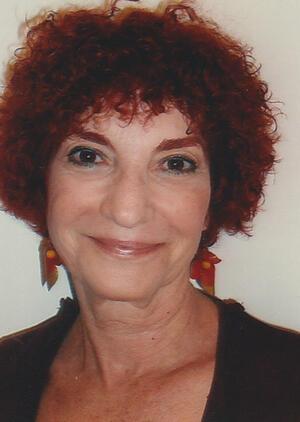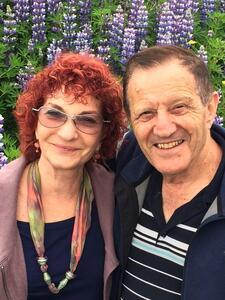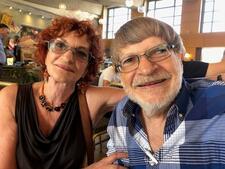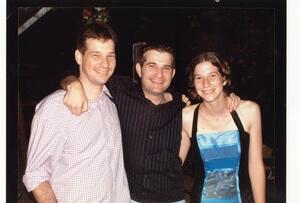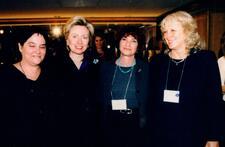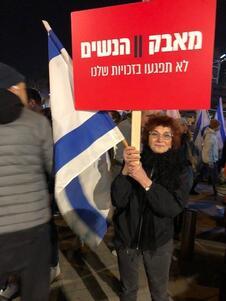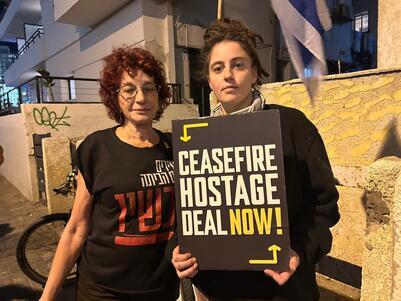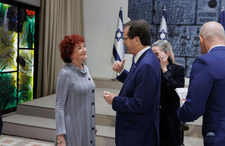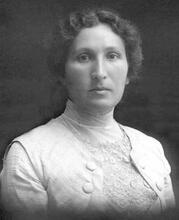Hanna Herzog
Professor Hanna Herzog is a pioneering researcher and activist whose work spans gender studies, ethnicity, sociology, and political activism. She has made significant contributions to understanding the role of marginalized groups in society, especially regarding women, and has explored their potential as agents of social change. Herzog's research has focused on various topics including gender and politics in Israel and the intersection between gender and religion. She has shaped academic and social activism in Israel through her work as a professor. Herzog has held leadership positions at different institutions and has earned several awards for her contributions to sociology.
Introduction: Prof. Hanna Herzog or Academia as Tikkun Olam
Feminism may be defined as the movement dedicated to advancing the human rights of women, and indeed of all human beings. One of the most prominent champions of this cause in Israel is Professor Hanna Herzog. Herzog’s career reflects a comprehensive blend of academic achievement and social activism, and she has made significant contributions to both sociology and human rights in Israel.
Herzog’s work is guided by fundamental principles summarized in her own words: “Knowledge is power, rooted in the lived experiences of individuals. Thus, scholars must listen to the diversity of voices and engage in critical reflection, continually asking: who else is marginalized, exploited and oppressed? Only by doing so can we transform the world for the better.” “Knowledge, Power and Feminist Politics” is the title of one of Herzog’s papers (Herzog 2000).
Herzog’s identity as a sociologist goes back to the Reali High School in Haifa, to a sociology teacher who worked for an electricity company and taught the subject as an extra job. The marginality of the teacher, the marginality of the profession at that time, her own marginality as a student who came from Kiryat Bialik, the then-small locality near the city of Haifa, who entered a very cohesive school class (she arrived in the eighth class) and was “different” from all the students, as her parents were spending three years in Nigeria while she remained in Israel to study—all these unconsciously influenced her choice to write a research paper on the elderly in Israeli society, which granted her an exemption from one subject in the matriculation examination.
Family Background
Hanna Herzog grew up in a deeply rooted Israeli family. Her maternal grandfather, Yehuda Lewin, was from Riga, where he was imprisoned for involvement in Zionist activities. There he met her grandmother, Hanna-Adela, a well-known French and German teacher who brought food to the prisoners. When Yehuda was released, they married. In 1921, they and their two sons immigrated to Israel, where Hanna's mother, Miriam, was born. Yehuda Lewin was among the pioneering industrialists in the Yishuv and founded the Ra'anan chocolate, candy, and coffee factory in 1924. Hanna-Adela provided new immigrants with food, a place to stay, and work. Miriam grew up in a middle-class family and studied at a seminary for school teachers and kindergarten teachers.
Herzog’s paternal grandfather, Shabtiel Deutsch, arrived in Palestine in 1909, establishing the first experimental station for the incubation of poultry. Stricken with malaria, he was forced to leave in 1911. He settled in Kayden in Lithuania, where he married Herzog’s grandmother Zipora. They had five daughters and one son—Moshe, Herzog’s father. Shabtiel Deutsch was involved in a variety of Zionist activities, and in 1925 the family returned to the Land of Israel. They lived in various places and finally settled in the new settlement of Yokneam, part of a small group of pioneers.
At seventeen, Hanna Deutsch's father, Moshe, began to work as a guard for the water wells near Yokneam. He lived in an old Arab khan (wayside inn) and in 1936 he joined the Haganah (the precursor to the IDF). In Yokneam, Moshe met Miriam Lewin, who came to work in a kindergarten. They married in 1942, and in 1945 they moved to Jerusalem, where Hanna was born on September 12, 1946; they remained in Jerusalem until the end of the Israeli War of Independence in 1948.
Early Years and Education
During the War of Independence, Herzog’s father fought in Jerusalem with the Haganah. At the end of the war, the family returned to Yokneam and her father enlisted in the permanent army. Herzog’s brother Yehuda (“Yudi”) was born in 1949. After Herzog’s father retired from the army, he joined Mekorot, the water resources company, and became a senior foreman of several major projects in Israel and abroad.
Hanna’s mother, Miriam, was the linchpin of the family. When the family left Yokneam for Kiryat Bialik, her mother opened a kindergarten in their home to cover the expenses of the three-bedroom house with its big garden of fruit trees. The house was also used as a sort of hotel for several employees who worked on water projects Moshe Herzog managed. Avry, Hanna’s second brother, was born in Kiryat Bialik.
When Herzog was a teenager, her father got a job in Nigeria, where her mother opened a Hebrew school for the children of Israelis who had come to work in the water and road developments. Hanna remained in Israel, as she had been accepted to the prestigious Reali High School in Haifa.
During high school, Herzog was a member of the Scouts youth movement, but, believing it was not ideologically oriented, she left it for HaMakhanot HaOlim, a left-oriented youth movement. After completing high school, she became closely connected with Ze’ev Herzog, her counsellor (madrich) in the youth movement, who would later become her life partner.
After graduating from high school in 1964, Herzog enlisted in the Navy and served as secretary to the commander of the Navy. Female soldiers generally stayed on duty at the base every other week, but Herzog requested permission to work shifts on the same days every week so she could study at Haifa University after work. When she was refused, Ze’ev took the opportunity to propose marriage, knowing that marriage would get her out of army service. The couple married in 1965. In Hanna’s words: “This is the greatest gift I received in my life—a friend for life, a loving and unconditionally feminist partner.”
In 1965, Hanna and Ze'ev began their studies at the Hebrew University in Jerusalem. Hanna studied Bible and sociology, a natural continuation of her studies at the Reali School, and received her BA in 1970. She chose to continue her studies in sociology at the graduate level.
The late 1960s and early 1970s, however, were marked by the War of Attrition, characterized by clashes between Israel and its neighbors to the north, south, and east. In 1969, during this conflict, Herzog’s brother Yudi sustained a severe brain injury while in pursuit of terrorists. The injury caused paralysis on the right side of his body and prevented him from expressing himself, either in speech or in writing. Herzog’s parents returned from Iran, where her father had been working. Her mother supported Yudi until the end of his life, but her father did not know how to deal with the severe disability and returned to Iran for an additional year.
To help Hanna's mother care for her brother, Hanna and Ze’ev moved to Ramat Hasharon. For Hanna, it was as though her distress, together with her vague but painful memories of the War of Independence, were transformed into the pursuit of knowledge and actions through which human suffering could be reduced.
On the same day the family received news of Yudi’s injury, Ze’ev was invited by Prof. Yohanan Aharoni, a leading archaeologist at Tel Aviv University, to do his doctoral studies under his supervision. Ze’ev later directed excavations at Tel Beer-Sheva, Tel Michal, Tel Gerisa, and Tel Yafo. He served as Director of the Institute of Archeology at Tel Aviv University and was the archaeological consultant for the Israel Nature and Parks Authority, supervising the development of the national parks at Tel Arad and Tel Beer-Sheva (UNESCO World Heritage sites).
In 1981, Hanna earned her doctorate in sociology from Tel Aviv University and became a lecturer in the Department of Sociology. However, her unfolding career was shadowed by the weighty responsibility of caring for her brother, which was made possible only thanks to the remarkable individuals she met along the way, especially Yudi’s friends, who remained by his side until his final breath in 2019.
During her long career, Hanna fondly remembers her teachers, who later became her colleagues, and many students, some of whom also became her academic colleagues. Above all, Hanna’s partner Ze'ev exemplifies the true essence of gender equality in their everyday life, including building dual academic careers. All these strengthened her belief that what she experienced could be a reality for women, not only in Israel but around the world.
The Herzogs have three children: Chen, an economist; Ben, a sociologist; and Stav, an educator.
Academic Achievements and Key Theoretical Contributions
In her studies, Herzog analyzes the reciprocal relations between exclusionary and inclusionary forces, through a theoretical and empirical attempt to uncover human experience that has been relegated to the margins. This approach encourages looking at marginalized groups not only as victims, but also as potential agents of social change.
Her research spans several domains:
1. Women and Gender
Herzog is a path-breaking researcher and a pioneer in the field of gender studies. Not only did she coined the Hebrew term migdar for “gender,” but she has also been a leader in the theoretical and empirical exploration of gender. From this perspective, she reinterprets historical narratives to highlight overlooked perspectives and question established interpretations, drawing attention to the role and place of marginalized groups and to the politics of everyday life.
Inter alia, Herzog’s study of the contribution of civic women’s associations, as they were called during the period of the Jewish community in Palestine prior to the establishment of the State of Israel. "Old Yishuv" refers to the Jewish community prior to 1882; "New Yishuv" to that following 1882.Yishuv, such as the Histadrut Nashim Ivriot (Hebrew Women’s Organization) and WIZO: Women’s International Zionist Organization, added a missing element to the historiography of “the state in the making.” Her work highlights these organizations’ unique contributions to society, including Tipat Halav (infant welfare clinics), social work, legal bureaus for family matters whose aim was to represent women before the rabbinical tribunals, and, of course, the struggle for women’s franchise (Herzog 1994).
Believing in blurring the boundaries between research and social activism, Herzog also met with Rachel Kagan-Cohen, chair of WIZO and a feminist pioneer who, along with Golda Meir, was one of the two women signatories of the Declaration of Independence—a meeting that drew her into the world of feminism.
A key topic to which Herzog has devoted her attention is the place of women in politics and the politics of women in Israel, on which she published numerous articles in Hebrew and English. Her 1999 book, Gendering Politics, laid the foundations for the understanding of processes of excluding women, not only from the political arena but also from various life spaces, while it also illuminates the potential for change for the future.
Herzog also analyzed the place of women in politics in Israel in several articles in Hebrew and in English. The book Sex, Gender and Politics (1999, Hebrew), which she wrote in collaboration with leading scholars of gender, is an important text for the study of women in Israel.
In her studies, Herzog also examines diverse spaces of women's exclusion and control, i.e. space in which women live in continuous uncertainty and under permanent threat. For instance, her study on highly educated Palestinian women who are citizens of Israel unveils the complexity of their experiences (including their location on the periphery of various social categories, such as citizenship, gender, nation, and belonging), demarcates the boundaries of their identities, and fosters multiple voices and solutions.
Herzog also proposes a sociological perspective on the study of the Shoah, emphasizing ethnic and gendered identities in several papers published, alone or with co-authors, between 2005 and 2010, as a product of a joint project she headed with female historians and sociologists from Israel and Germany that studied female Holocaust survivors of the Ravensbrück concentration camp for women.
After her retirement, Herzog collaborated closely with young researchers. With Dr. Sigal Ron-Nagar, she led a two-year research project on “Women’s Life in Uncertainty,” whose results were published in a special issue of Israeli Reading (Hebrew) in 2024. She also led, with Dr. Amit Kaplan, a research group on women’s invisible work, which explored the concept of “transparent work,” unpaid practices that are not defined as “work,” such as cooking at home, childcare at home, and serving coffee in the office.
2. Ethnicity, Labeling, and Racism
Herzog pioneered the study of ethnic political identity in her PhD dissertation and her groundbreaking book, Political Ethnicity: The Image and the Reality (1986). She was one of the first sociologists to question the categorization of Lit. "Eastern." Jew from Arab or Muslim country.Mizrahi versus Jews of European origin and their descendants, including most of North and South American Jewry.Ashkenazi Jews as given categories of analysis, then prevalent in the sociology of ethnic relations in Israel. Her theoretical claim was that identity categories grow and change in connection with power relations, labeling, and exclusion.
Herzog has published extensively on this subject, extending her analysis to negotiated ethnicity, national identities, religious groups, Palestinian citizens of Israel, and Ethiopian Jews. She has participated in a comparative study on Getting Respect: Responding to stigma and discrimination in the United States, Brazil, and Israel (Lamont et al 2017).
3. Generations, Locations, Identities
In an attempt to propose a broad view that includes experiences as variegated as possible, Herzog has proposed the term “generation” as an analytical tool, making it possible to free sociological discourse from its anchoring in cleavages and binary perceptions. She has published several papers based on the analytical concept of generation, demonstrating that a generational perspective does not produce a cohesive and uniform story.
A conference in honor of the 80th birthday of world-renowned sociologist S.N. Eisenstadt that Herzog initiated and organized resulted in a volume to which the most distinguished sociologists contributed articles: Generations, Locations, Identities: Contemporary Perspectives on Society and Culture in Israel: Essays in Honor of Shmuel Noah Eisenstadt (2007).
4. Gender, Religion, and Politics
Herzog led several research projects on the relationships between gender, religion, and the state. She conducted the first with Anat Lapidot-Firilla from 2001 to 2005. The resulting book, Theseus’s Paradox: Gender, Religion and State (Hebrew, 2014), contains case studies relating to the relationships between the three categories and the ways they are negotiated, change, and take on new meaning.
Herzog’s interdisciplinary book Gendering Religion and Politics: Untangling Modernities (2009), co-edited with Ann Braude of Harvard University, focuses on Muslim, Christian, and Jewish women of diverse nationalities as they engage in politics and construct and navigate modernity. Herzog’s chapter, “Imagined Communities: State religion and Jewish Religious Women Settlers,” presents a gender analysis of the new religious communities that have developed in the Israeli settlements.
In other studies, Herzog refers to the ways women became central actors in pre-State struggles for social equality in Israel, as in her 2021 article “One hand giveth, the other taketh away: A feminist perspective on polity, religion, and gender in the pre-State period,” in which she focuses on the struggle for women's right to vote and on the institutionalization of the Chief Rabbinate in the 1920s.
5. Sociology of Knowledge and Research Methodology
Herzog’s research follows the interplay between social conditions and ideas. Knowledge is understood as a social production. The meaning of social locations, roles, and positioning are socially constructed. Thus, methodology is an integral part of theory in Herzog’s work: it is the essence of qualitative research in general, and of in-depth interviews in particular. In several articles, Herzog discusses the site of an interview as part of the reciprocal relations that exist between interviewer and interviewee, pointing to the fact that silence in the interview is an integral part of silencing social processes (Herzog and Lahad 2006).
Mentoring the Next Generations
Herzog sees her academic role as expanding knowledge not only through publication but also through raising generations of educated people, especially women and those who come from less privileged places in society. Through her academic work, she has widely influenced generations of students and scholars by integrating feminist theory, intersectionality, and critiques of state power into the social sciences curriculum. Moreover, as she often states with pride, she has never said no to a student who wanted her to supervise an MA thesis or doctoral dissertation. The best of her many students are now faculty members at universities and colleges in Israel and abroad or hold key positions in the worlds of business and social activism.
Academic and Political Activism
In addition to her academic contributions, Herzog is a well-known and courageous political activist who challenges social and political structures that perpetuate inequality. Her activism is tied to her academic work, as she seeks to create social change by applying her theoretical insights to real-world issues, especially those affecting marginalized communities. This combination of academic rigor and activism makes her a significant figure in the social sphere as well.
Herzog was elected head of the Department of Sociology and Anthropology at Tel Aviv University in 1998 and became full professor in 2014. She has been associated with several prominent academic institutions and research centers in Israel, where her leadership and contributions have had a significant impact.
- She was among the founders of the Academic College of Tel Aviv-Yaffo, where she headed the Society and Politics Program from 1994 to 2005.
- She was among the founders of the Women and Gender Studies Program at Tel Aviv University in the late 1990s, together with Hanna Naveh, Dafna Izraeli, and Ariella Friedman, and led the program from 2009 to 2014.
- She was the president of the International Association for Israel Studies from 1999 to 2001.
- From 2004 to 2014, she served as the head of the Civil Society forum at the Van Leer Jerusalem Institute, a leading research institute in Israel. In 2009, she was among the founders of the Institute’s Center for the Advancement of Women in the Public Sphere (WIPS), which is committed to the idea of gender mainstreaming as an overall strategy for promoting the democratic and civil status of women in various groups, and from 2006 to 2012 she headed the Institute’s Civil Society section.
- She has been a visiting scholar at Boston College, the City University of New York, and the Harvard University Women’s Studies in Religion Program.
- She is among the founders of the journal Israeli Sociology and served as a member of its editorial board and as its editor.
- She has been actively associated with the late Prof. Alice Shalvi and the Israel Women’s Network, which advocates for women’s rights and gender equality in Israel.
- She participated in an international study group that was the basis of the book Getting Respect: Responding to stigma and discrimination in the United States, Brazil, and Israel (Princeton University Press).
- She is part of the yearly Gender Index, an innovative tool developed by WIPS that evaluates gender inequality in Israel.
- Since 2017, she has been co-director of the Van Leer Institute’s Yoda’at, (She Knows), The Knowledge Center for Women and Gender. Yoda’at’s website (in Hebrew, Arabic, and English) aims to create and make accessible gendered knowledge and offers a wide variety of information, including statistical data, studies, articles, video clips, guides, organizations, committee protocols, books, and laws.
- In 2018, Herzog was awarded the Emet Prize, a prestigious Israeli prize awarded annually for excellence in academic and professional achievements that have far-reaching influence and make a significant contribution to society.
- In 2022, she received the Association for Israel Studies (AIS) Lifetime Achievement Award, conferred in recognition of her outstanding contributions to the fields of sociology and Israel studies.
Hanna Herzog, now Professor Emerita of Sociology at Tel Aviv University, continues to build a multifaceted space of knowledge and action that has influenced both academia and policy for decades. Needless to say, she is a source of inspiration for people dedicated to championing gender equality and social justice.
Selected Works by Hanna Herzog
“Women’s associations in civil circles: the forgotten chapter in the historiography of the Yishuv.” Katedra 70, 1994: 111-133 (Hebrew).
“Homefront and Battlefront and the Status of Jewish and Palestinian Women in Israel.” Israeli Studies 3, 1 (1998): 61-84.
Gendering Politics: Women in Israel. Ann Arbor: The University of Michigan Press, 1999.
“A Space of Their Own: Social-Civil Discourses among Palestinian Israeli women in Peace Organizations.” Social Politics: International Studies of Gender, State and Society 6, 3 (1999): 344-69.
“Any Year Can Be Taken as the Beginning: Periodization and Identity in the Debate of the 1950s.” Theory and Criticism: An Israeli Forum 17 (2000): 209-216 (Hebrew).
“Knowledge, Power and Feminist Politics” Pp. 269-293 In Reflection of a Society, edited by Hanna Herzog, 269-293. Tel Aviv” Ramot Publication, 2000 (Hebrew).
“Redefining Political Spaces: A Gender Perspective on the Yishuv Historiography.” The Journal of Israeli History 21, 1-2 (2002): 1-25.
“Absent Voices: Citizenship and Identity Narratives of Palestinian Women in Israel.” In Israeli in Conflict: Hegemonies, Identities and Challenges, edited by Adriana Kemp, David Newman, Uri Ram, and Oren Yiftachel, 236-252. Eastbourne, UK: Sussex University Press, 2004.
With Agate Krauss. “Women's Knowledge: A Resource and Policy Research Center as a Lever for Discursive Change.” Irish Feminist Review 1, 1 (2005): 53-73.
“Between the Turf and the Gravel: Women, Politics, and Civil Society.” Democratic Culture 10 (2006): 191- 214 (Hebrew).
“Trisection of Forces: Gender, Religion and the State: The Case of State-Run Religious Schools in Israel.” British Journal of Sociology 57, 2 (2006): 241-62.
With Kinneret Lahad, eds. Knowledge and Silence: On Mechanisms of Denial and Repression in Israeli Society. Tel Aviv: The Van Leer Jerusalem Institute and Hakibbutz Hameuchad Publishing House, 2006 (Hebrew).
“Feminist Perspectives on the Political.” Theory and Criticism 34 (2009): 155-64
With Ann Braude, eds. Gendering Religion and Politics: Untangling Modernities. New York, Jerusalem: Palgrave Macmillan; Van Leer Jerusalem Institute, 2009.
With Adriana Kemp. “Do We Have a Home? The ‘Sense of Home’ in the Narratives of Jewish Women Survivors of Ravensbruck.” In A Holocaust Crossroads: Jewish Women in Ravensbruck, edited by Irit Dublon Knebel, 176-204. London and Portland, OR: Vallentine Mitchell, 2010.
“The Chief Rabbinate: From a Mechanism of Colonial Control to Institutionalization of National, Ethnic and Gender Boundaries.” In Zionism & Empires, edited by Yehouda Shenhav, 237-265. Jerusalem: The Van Leer Jerusalem Institute and Hakkiutz Hameuchad, 2015 (Hebrew).
“Are Women Really Equal in the People’s Army? A Gender Perspective on the Israel Defence Forces (IDF).” In Women and Gender in Military Affairs: An International Comparison, edited by Robert and Mayesha Alam Egnell, 153-172. Washington, DC: Georgetown University Press, 2019.
“Personal and Human Security: Redefining the Security Paradigm from a Gender Perspective.” In Israel and Its Palestinian Predicament: A Constructive Strategic Perspective, edited by Amal Jamal, 69-102. EU, ORG, I`lam Arab Center for Media Freedom, Development and Research, 2020.
“One Hand Giveth, the Other Taketh Away: A Feminist Perspective on Polity, Religion, and Gender in the Pre-state Period.” Israel Studies Review 36, 2 (2021): 31-47.

